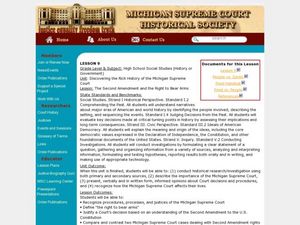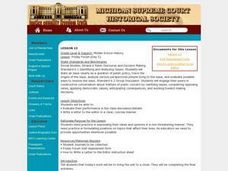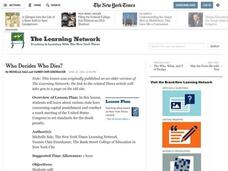Curated OER
The Second Amendment and the Right to Bear Arms
Students interpret the Second Amendment. In this U.S. Constitution lesson, students examine the right to bear arms as they compare 2 Michigan Supreme Court cases and discuss their personal interpretations of the amendment.
Curated OER
The Bill of Rights
Learners examine the intent Bill of Rights. In this American government lesson plan, students watch segments of the Discovery video "The Bill of Rights." Learners discuss and debate the 4 Supreme Court cases featured in the...
ProCon
Obamacare
Former President Barack Obama reformed the United States' health care system with Obamacare, but is the new legislation good for America? Scholars read a historical timeline about the passage of health care reform laws and compare United...
Curated OER
Friday Forum
Middle schoolers research a variety of controversial articles to gain knowledge. They form an opinion and defend their position with supporting data. They evaluate opposing arguments and present their viewpoint both verbally and in the...
Curated OER
The Second Amendment and the Right to Bear Arms
Students examine procedures and processes of the Michigan Supreme Court. They explain the Second Amendment to others. They compare and contrast two cases dealing with the Second Amendment.
Curated OER
The People's Right to Know
Students review Supreme Court ruling on the right to know, prior restrain and access to government. They read The Progressive case and hold a moot court to argue the outcome.
Curated OER
Law School vs. School Laws
Students discuss the military's "Don't ask, don't tell" policy regarding sexual orientation and restage the debate leading up to the recent decision in Rumsfeld v. FAIR. They write essays evaluating the merits of the decision.
Curated OER
Third Grade Social Studies
In this social studies worksheet, 3rd graders complete multiple choice questions on the Pilgrims, government, economics, and more. Students complete 25 questions.
Curated OER
Friday Forum
Students research controversial issues and formulate their own opinion. They defend their position with supporting data and evaluate arguments from opposing viewpoints. They present their stand both verbally and in the written form.
Curated OER
Dred Scott and the Constitution
Students investigate the outcome of the Dred Scott case. In this human rights lesson plan, students read Justice Taney's decision about property rights and citizenship. Students write essays about the outcome of the case and President...
Curated OER
Freedom of Expression in Special Places
High schoolers identify at least three places presenting First Amendment problems. They analyze how the First Amendment applies to school newspapers. Students argue for and against limiting First Amendment rights in school. They...
Curated OER
Freedom of Expression in Special Places
Young scholars analyze the judicial decision making process, and identify three places presenting First Amendment problems. They analyze how the 1st Amendment applies to school newspapers, and argue for and against limiting 1st Amendment...
Curated OER
Hazelwood v. Kuhlmeier
Students read the case text of the Hazelwood v. Kuhlmeier case. Using the text, they discuss the case history and the implications of the verdict. They share their findings with the class in the form of a PowerPoint presentation and...
Curated OER
Friday Forum (Day 5)
Students evaluate their performance in different debates about the laws of Michigan. They write a letter to an editor of a newspaper sharing their opinions. They write journal entries as well.
ProCon
Gun Control
According to some estimates, there are more guns than people in the United States. Learners decide if America should enact more gun control laws. They analyze information about gun deaths in the United States by year, read about the...
ProCon
Gay Marriage
The first legal gay marriage in the United States occurred in Massachusetts in 2004. Since then, countless others have tied the knot. Scholars decide whether gay marriage should be legal by reading a history of the issue, analyzing the...
Curated OER
POLITICS AND RELIGION: Targeting Faith When It Counts
High schoolers research current articles about the influence of religion on the presidential election of 2004.
Curated OER
Who Decides Who Dies?
Students explore various state laws concerning capital punishment and conduct a mock meeting of the United States Congress to set standards for the death penalty.
Curated OER
Near v. Minnesota
Students discuss what free press means and what it would be like without this right. They read the summary from the Near v. Minnesota case. In groups, they analyze a problem and report to the class.
Curated OER
Mock Appellate Arguments
Students participate in a mock appellate argument by role playing a case. They develop a case and present it to the judge using proper argument techniques.
Curated OER
Search and Seizure: What Does It Mean?
Students, in a juvenile correctional facility, study the meaning of the Fourth Constitutional Amendment. They study definitions and complete worksheets to investigate the implications of the amendment.
Curated OER
Refugees from the Caribbean: Cuban and Haiti "Boat People"
Students investigate the plight of Cuban and Haitian refugees. In this refugee lesson, students discover the history of "boat people" and U.S. policies regarding refugees. Students role play presidential advisers that must recommend new...
Curated OER
Judges in the Classroom
Learners define the legal meaning of juvenile and identify various ways to treat young offenders. They identify the current philosophy of the Utah juvenile justice system using a true/false worksheet and discussion format.
Curated OER
Should the United States Have a Central Bank?
Pupils assess the validity of a national bank. They study the importance of McCullough v. Maryland. They review the arguments of Hamilton and Jefferson. They analyze the Tenth Amendment and the debate over state v. federal power. They ...























